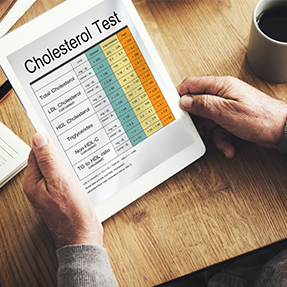
Uncovering myths and facts about cholesterol
Likely you know that heart disease is the leading cause of death in both men and women in the United States. This disease can eventually lead to a life-threatening heart attack or stroke. There are several risk factors for heart disease, one of which is high blood cholesterol.
If you have high blood cholesterol or even if you don’t, read on to learn common myths about cholesterol and the truth about it.
Myth: It’s not necessary to have your cholesterol levels checked until past the age of 50
Fact: The American Heart Association (AHA) advises children between ages 9 and 11 to check cholesterol levels once, then to check again between ages 17 and 21. Once a child is 20 and older, the AHA recommends that a person’s primary care physician determine the frequency of rechecking cholesterol and other risk factors every 4 to 6 years if risk remains low.
Myth: The only people at risk for high blood cholesterol are overweight or obese
Fact: It doesn’t matter what body size or shape you have as anyone can have high cholesterol levels. However, excess weight gain does increase your risk for high cholesterol, but being thin is not a protector either. That’s why the AHA still recommends regular cholesterol checks even if you are physically fit and at a healthy body weight.
Myth: My doctor has never mentioned getting my cholesterol checked, so I must be okay.
Fact: The message here is to advocate for your health. If you are older than 20 and your cholesterol level has never been checked, ask your doctor to order a blood cholesterol check. They should also assess your risk factors for heart disease. Risk factors increase your risk for heart disease, and the more you have, the greater your risk. That’s why making healthy lifestyle changes are important for reducing your risk.
Myth: Only men have high cholesterol levels
Fact: Wrong. Heart disease affects both men and women, especially after women go through menopause. AHA statistics show that each minute of each day, one woman dies from heart disease in the U.S.
What is true is that plaque buildup in the arteries known as atherosclerosis occurs later in women than in men. In addition, certain women-specific conditions can also predispose women to develop heart disease which includes premature menopause (less than age 40) and pregnancy-associated conditions, such as gestational diabetes and preeclampsia (high blood pressure during pregnancy).
Myth: High cholesterol levels are always a result of poor food choices and physical inactivity
Fact: Following a healthy diet and regular exercise do influence your cholesterol. But, these risk factors are within your control. Many risk factors are out of your control, such as getting older and having a family history. Some people with high blood cholesterol have a condition called familial hypercholesterolemia. This condition is from a gene alteration passed from one or both parents. If you are born with familial hypercholesterolemia, your body struggles to rid itself of atherosclerotic plaque buildup in the arteries. If this condition is left untreated, you will have a 20 times greater risk of developing heart disease.
Myth: As long as you take medications for lowering cholesterol, you don’t have to make lifestyle changes
Fact: Prescribed cholesterol medication is important; however, combining a heart-healthy diet with regular exercise, will significantly lower your risk of heart disease even further.
Myth: The food label states, “no cholesterol,” so it must be a healthy food to eat
Fact: Only foods of animal origin contain cholesterol. This means foods such as beef, poultry, fish, eggs (found only in the yolk), and cheese are animal-food sources of cholesterol. No plant-based foods contain cholesterol. But, if the label states “no cholesterol” or “low fat,” beware. Other “bad” fats, such as saturated fat and trans fats, also increase heart diseases. Always check the Nutrition Facts Label to search for saturated fat and trans fat amounts per serving size of the food. The current AHA recommendation for saturated fat is no more than 13 grams per day and 0 grams of trans fat per day.
Myth: It’s best to avoid butter and use only margarine
Fact: First, it is unrealistic to give up butter entirely. Secondly, both butter and margarine have pros and cons. For instance, while it is true that butter contains artery-clogging saturated fat, margarine also contains unhealthy combinations of saturated and trans fats. If you do use margarine, the healthier choice is to stick with tub or liquid margarines. Stick margarine is higher in saturated fat than tub margarine and has the same amount of fat and calories per serving as butter.
If you like more ‘natural’ foods, butter is made from just one or two ingredients: cream and sometimes salt. However, one tablespoon of butter has 7 grams of saturated fat and 100 calories. So, the best advice is to save butter for special recipes and occasions and use it sparingly.
Bottom line, use butter sparingly for special foods, and use either tub or liquid margarine also sparingly, and rarely use stick margarine.
Dr. David Samadi is the Director of Men’s Health and Urologic Oncology at St. Francis Hospital in Long Island. He’s a renowned and highly successful board certified Urologic Oncologist Expert and Robotic Surgeon in New York City, regarded as one of the leading prostate surgeons in the U.S., with a vast expertise in prostate cancer treatment and Robotic-Assisted Laparoscopic Prostatectomy. Dr. Samadi is a medical contributor to NewsMax TV and is also the author of The Ultimate MANual, Dr. Samadi’s Guide to Men’s Health and Wellness, available online both on Amazon and Barnes & Noble. Visit Dr. Samadi’s websites at robotic oncology and prostate cancer 911.
